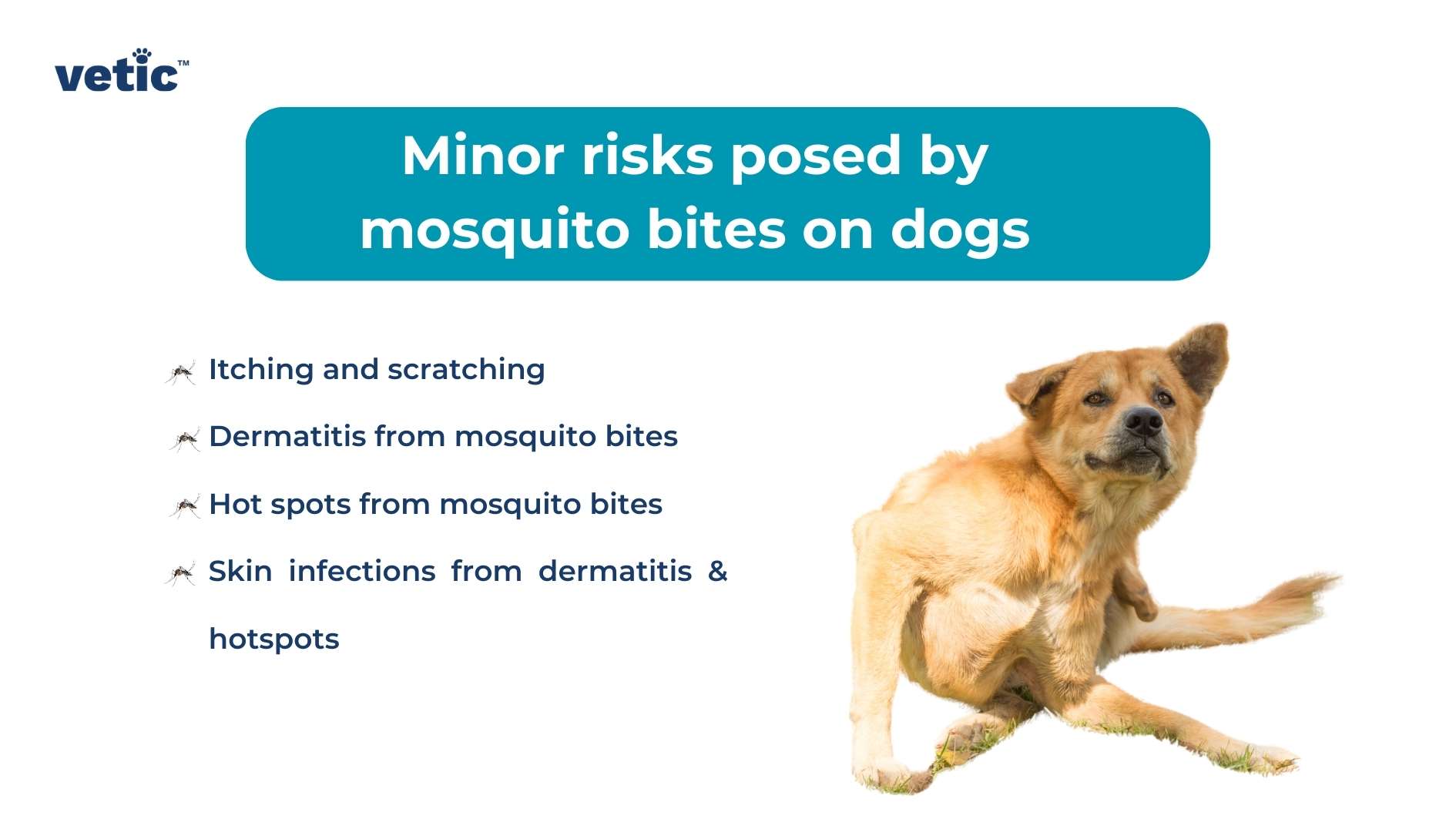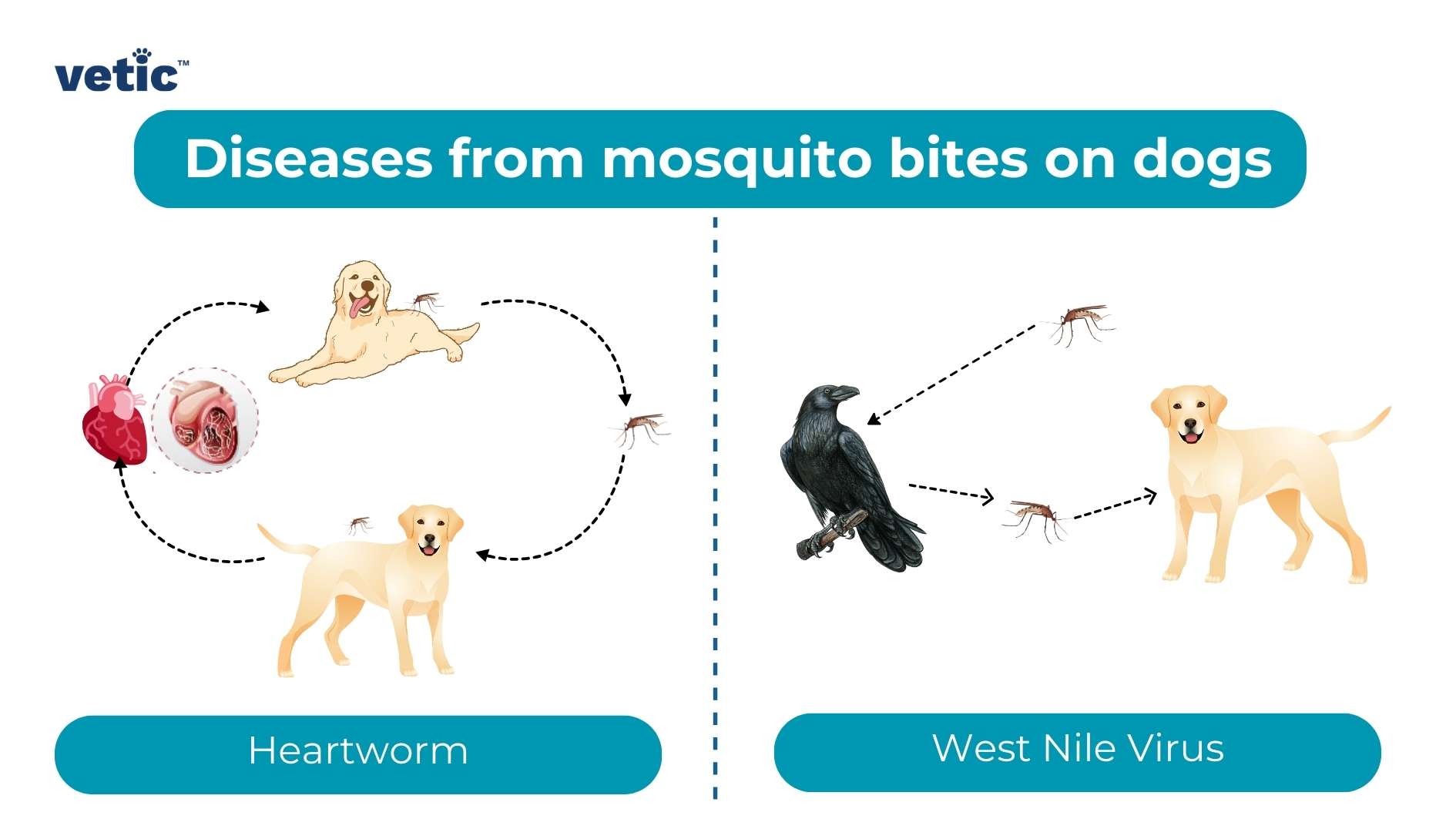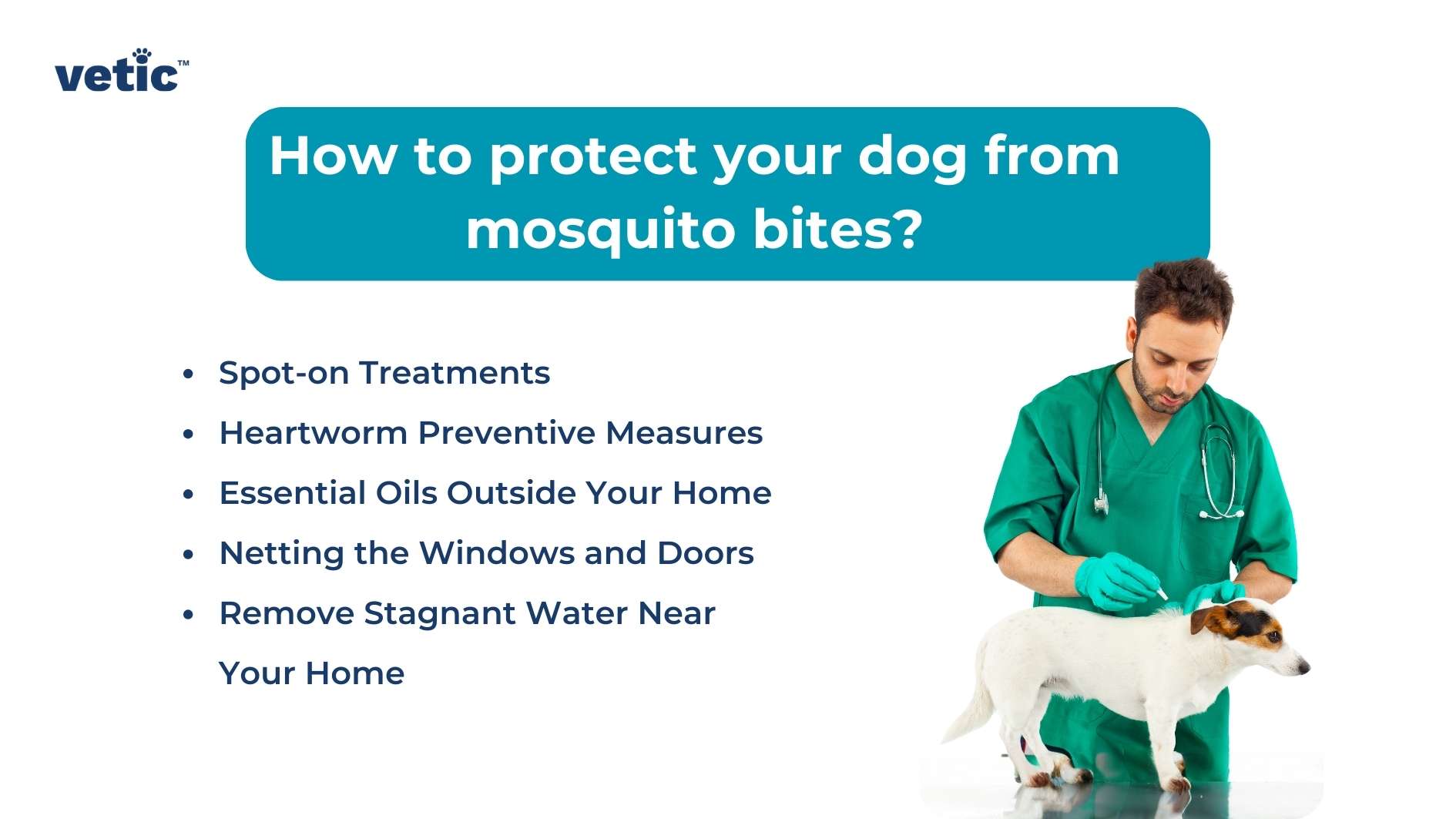It’s that season again! The smell of freshly drenched soil, lush green grass, blooming trees and the bountiful buzzing of mosquitoes! Mosquitoes are annoying beyond any description, and they don’t just bite us. Mosquitoes also bite our pets, dogs and cats. If you have never thought about the effect of mosquito bites on dogs, let’s think together right now.
Mosquito bites on dogs can be as bening as a small bump or as serious as a potential threat to their heart health. Today, we will talk about why mosquitoes are a health risk to all dogs, what diseases mosquito bites on dogs can spread and how to prevent mosquito bites on people.
Why are mosquito bites on dogs a real risk in India?
India is endemic to mosquito-borne illnesses such as malaria, dengue fever, chikungunya and the West Nile virus. Most of these diseases affect humans, but some affect our canine friends as well.
Mosquitoes are found almost everywhere in India. From the foothills of the Himalayas to the coastal regions of Mumbai. From Delhi NCR to Bengaluru, mosquitoes have established their domain all over the country.
All they need is a little water and some humidity to breed and multiply. It is very difficult to control the mosquito population in any city or suburb in India due to the multitude of fallow lands, marshy areas and accumulated garbage.
Hence, mosquitoes have always been and, sadly, will remain a real risk in India even for your pets.
What are the minor risks posed by mosquito bites on dogs?

Itching and scratching
Just like we keep scratching mosquito bites on our forearms and legs, your dog will likely do the same after being bitten. It is more common for short-haired breeds to get bitten as compared to the long-haired breeds.
Mosquito bites on dogs can begin with small annoying bumps that are itchy. It can lead to excessive nibbling, and scratching followed by skin infections and more.
If you see your dog nibbling or scratching a particular area obsessively look for tiny bumps that can be mosquito bites. Do not apply human medication or mosquito bite-relief solutions on your dog’s skin. (We don’t lick our skin after applying itch-relief creams and solutions, hopefully, but dogs do!) Apply a veterinary itch-relief spray to ease your dog’s discomfort.
Dermatitis from mosquito bites (allergic reaction)
Some people don’t get tiny bumps but huge welts and hives from mosquito bites, and the same is true for dogs!
You will know if your dog is having allergic reactions to mosquito bites (allergic dermatitis). They will develop angry red hives where the mosquito has bitten them, and they will keep licking and biting the spot relentlessly until it becomes infected!
Don’t wait until it becomes infected. If you see signs of dermatitis from mosquito bites on your dog take them to see a veterinarian ASAP. You can prevent them from scratching the spot by engaging them in play and treats.
Hot spots from mosquito bites on dogs
Hot spots can be annoying, painful and a lot of trouble for both the dog and the pet parent. These are visible, hairless areas or patches that look pretty raw on the dog’s skin.
They arise from allergic reactions to mosquito bites followed by a lot of licking, chewing and scratching. Trust us! If your dog develops a hot spot, you won’t be able to miss it even if they are a long-haired breed.
Hot spots are quite serious since they can seed fungal skin infections, bacterial infections and chronic hair loss in dogs. If you notice one, you should visit the veterinarian for a remedy. Avoid using human medication and disinfectants on your dog. Yes, that includes NOT USING Dettol or Savlon!
What are the serious diseases spread via mosquito bites on dogs?

Just like how mosquito bites can spread some deadly diseases in humans, they can also spread serious diseases in dogs. Here are some of the most common yet concerning diseases spread by mosquito bites on dogs –
Heartworm disease in dogs
Mosquitoes can pick up the pre-larval stage heartworms from infected dogs while sucking their blood. When they bite a healthy dog, they transmit the early-stage heartworms into the healthy dog’s skin.
The larvae migrate through the tissues, into the bloodstream of the healthy dog. The young adult heartworms enter the heart and pulmonary arteries within 70 days of the bite. The final maturation of the heartworm takes place in the arteries of the lungs.
Heartworms can live for as long as 5 to 7 years inside the dog’s cardiovascular system.
Initial signs of heartworm infection in dogs can be confusing for pet parents since they mostly include –
- Weakness and aversion to exercise
- Coughing from sudden exertion
- Rapid heart rate
Before causing more serious problems. Heartworms can cause significant damage to the dog’s heart and lungs leading to right heart enlargement and heart failure from pulmonary hypertension.
West Nile virus in dogs
Dogs can contract the West Nile virus much like their humans. They are considered more resistant to the infection. However, puppies and older dogs, and immunocompromised dogs fall victim to the West Nile virus transmitted by infected mosquito bites.
The West Nile virus has been particularly rampant in Kerala and a few other surrounding states. It is indeed possible for dogs as well as cats to get infected by the West Nile virus through an infected mosquito bite.
The signs of the West Nile Virus disease include –
- Weakness
- Inappetence
- Muscle spasms
- Fever
Blood tests are required for the confirmation of the diagnosis. The treatment of the West Nile virus is similar to the treatment of other viral infections in dogs including canine coronavirus and canine parvovirus. It mostly includes symptomatic treatments and recovery chances are quite good.
If your dog begins showing signs such as weakness, tremors and fever after being bitten by mosquitoes, contact your veterinarian for a proper diagnosis and treatment.
Additionally, there is no evidence that humans can get the virus from infected dogs (or cats).
How to protect your dog from mosquito bites?

Spot-on Treatments According to Your Dog’s Body Weight
Spot-on treatments are applied directly to the dog’s skin, offering protection against mosquitoes by repelling and killing them on contact, thus reducing the risk of bites and diseases.
Anti-Flea/Tick Chews as Recommended by Your Vet
These chews contain insecticides that help repel and kill mosquitoes. They are ingested by the dog and provide systemic protection, ensuring mosquitoes are repelled before they can bite.
Heartworm Preventive Measures (Medicines)
Heartworm preventives kill larval heartworms transmitted by mosquitoes, preventing them from developing into adult worms. Regular administration is essential for protecting dogs from heartworm disease.
Essential Oils Outside Your Home
Certain essential oils, like eucalyptus and lavender, can be used in outdoor areas to repel mosquitoes. Ensure these are used in diluted forms and in well-ventilated spaces only.
Netting the Windows and Doors
Installing netting on windows and doors creates a physical barrier that prevents mosquitoes from entering your home, providing an effective way to protect your dog from bites indoors.
Remove Stagnant Water to Stop Mosquito Breeding
Mosquitoes breed in stagnant water. Regularly check and eliminate any standing water around your home, such as in buckets, birdbaths, or plant saucers, to reduce mosquito populations.
What NOT to use for protecting your dog from mosquitoes?
Do NOT Use Citronella in Your Home
Citronella products can be toxic to dogs if ingested or inhaled. Avoid using citronella candles, oils, or sprays inside your home to protect your pet’s health.
NEVER USE DEET REPELLENTS near your pet
DEET-containing repellents can be harmful to pets. When ingested or absorbed through the skin, DEET can cause neurological issues such as tremors, seizures, and even death in severe cases. It’s essential to avoid using these repellents near pets to prevent accidental exposure and potential poisoning. Instead, opt for pet-safe alternatives specifically designed for animal use to ensure their safety and health.
Can you always protect your dog from mosquito-borne diseases?
It is impossible to protect dogs from mosquito bites unless you are keeping their repellent collars in shape and keep your entire environment mosquito-free.
It is always advisable to ask your veterinarian for heartworm tests for your dog. In many clinics across India, heartworm tests or heartworm antigen tests come in kit form that can take barely 10 minutes of your time, but save your dog’s life!
All dogs require a heartworm antigen test at least once a year even if they take heartworm preventives throughout the entire year.

